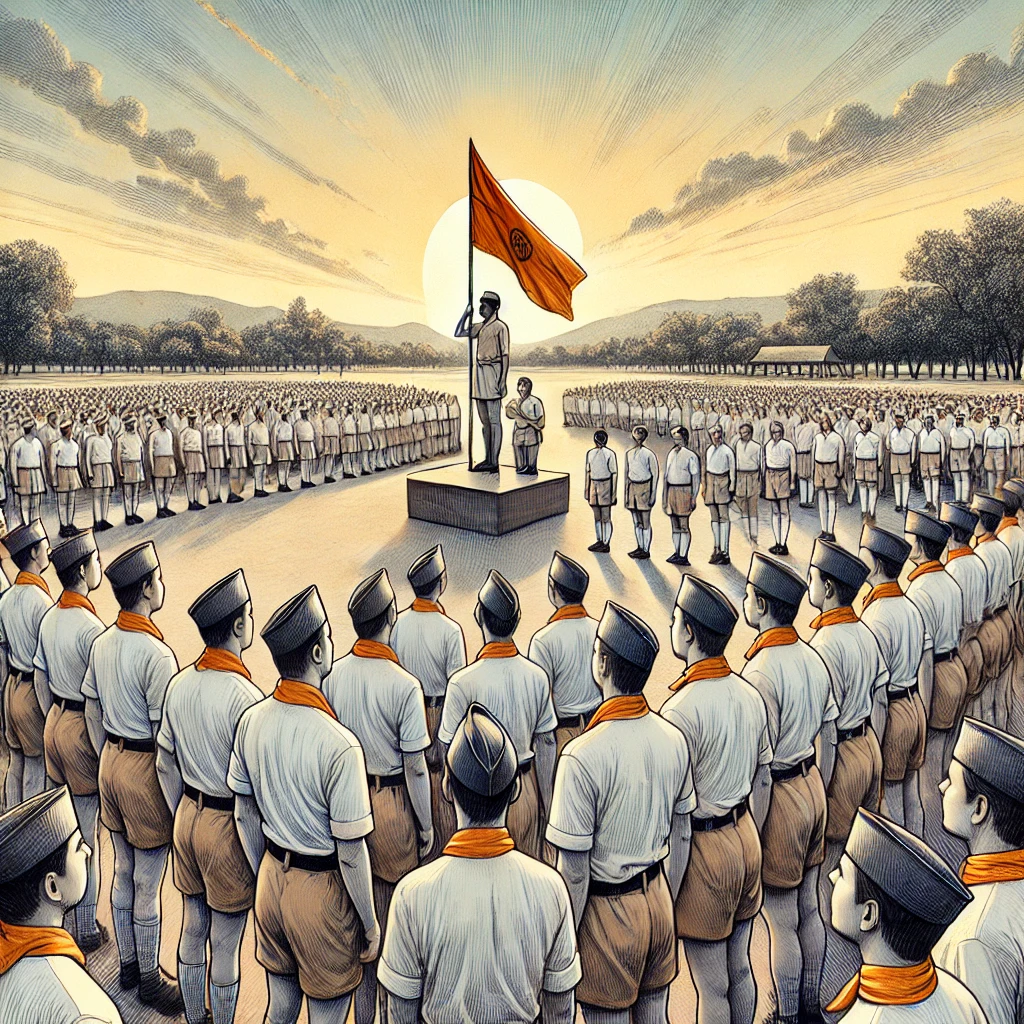The Rashtriya Swayamsevak Sangh, or RSS for short, is one of the most important socio-cultural institutions in India which was birthed with the core values of nationalism, preservation of culture and selfless service to the society. It was founded in the year 1925 by Dr. Keshav Baliram Hedgewar where over the decades it has manifoldly influenced the political, social and cultural scenarios of the nation. It has received accolades for its contribution towards nation-building while also being demonized for its ideology. The essay in hand succinctly details the RSS’s history, its goals and aspirations, its structure, its various roles, and controversies as well as its relevance in the Indian social structure today.
Historical Backdrop and Establishment The Rashtriya Swayamsevak Sangh Hindi meaning the National Volunteer Organization was established on 27th September in 1925 Aagpur, Maharashtra by Dr K.B Hedgewar. The Section was formed to appeal to the Political and social situation present in India during the British rule. Hegdewar, motivated by a strong national sentiment and the need for cultural supplementation, envisioned an association that served the function of consolidating the Hindu society, fostering discipline and equipping the people for the services of the country.
The early of the RSS were character cultivation, self-control self-discipline and physical training which used to occur daily these were colloquially called shakhas or branches. The organization sought to provide a sense of pride in Indianness which involves the Indian ancient culture and its traditions while engaging in selfless devotion to the service of the country.
Rashtriya Swayamsevak Sangh: Goals and Philosophy
Hindutva Gotra AM affiliated with RSS is founded on the idea of Hindu-ness coined by Veer Savarkar that goes beyond just attachment to religion to include all that India represents as a civilization. This ideology finds its place in the core thoughts of RSS. In a succinct format the areas that RSS targets include:
- Cultural Preservation: To protect and promote India’s ancient culture, traditions, and values.
- National Integration: For the people of various regions to get amalgamated into a particular culture.
- Selfless Service: Encouragement and promotion of volunteering to practice selfless service.
- Building Character: It aims at discipline, patriotism and good morals from the citizens of India.
- Promotion of Hindutva: Cultivating the idea of unity in cultural diversity based on the rich Indian heritage, India’s ancient Hindu civilization.
As envisioned by RSS here is India where every person including a Muslim or a Christian feels affiliated with its ancient civilization.
Rashtriya Swayamsevak Sangh: Organizational Framework
Hindu involvement in RSS is voluntary with an active force termed swayam sevaks which lacks membership and enjoys a self-governed society. Decentralization is a key attribute of its ideological framework but discipline remains intact.
- Sarsanghchalak (Chief): The formulation of policies lies in his domain and is attended by others under his supervision. Currently, Mohan Bhagwat is the designated Sarsanghchalak.
- Shakhas (Branches): These are everyday routines of all swayamsevaks where interactions happen and exercises alongside discussions on various topics occur.
- Prant (Regional Units): India is carved out in terms of regions for administrative purposes.
- Akhil Bharatiya Pratinidhi Sabha: This is the supreme decision-making body, which makes any policies and strategies.
Volunteer-based activities are more important for the RSS.
Significant Contributions And Activities
The formation of the RSS is said to have played a crucial role in several social, cultural, and national movements throughout the history of India. Some of its major works include:
- Involvement In The Freedom Struggle:
They were not part of the Armed freedom struggle but they did socio-political work for mobilising people and even spreading anti-British sentiments. Even Dr. Hedgewar has been involved in the anti-British movements before the formation of RSS.
- Helping Out In National Crises:
The RSS helped after the Partition of India in 1947 by working to relocate and help people who were fleeing from communal riots.
- Contribution During Earthquakes, Floods, And Pandemics:
The RSS has been constantly serving during times of calamities like earthquakes, floods, and pandemics by offering disaster management services.
- Educational And Cultural Engagements:
The RSS has been at the forefront of creating different academic institutions like the Vidya Bharati network and the goal is ‘To Establish A System Of True Value Based Education Of Indian Culture’.
- Promotion of Indigenous Art and Culture:
The organization’s continual effort to enhance the Indigenous art forms, cultural practices and traditional knowledge has proven worthwhile.
- Formation of Affiliates (Sangh Parivar):
- Bharatiya Janata Party (BJP): While the RSS has been one of the strongest ideological promoters of BJP, the political party has come into being concerning RSS.
- Bharatiya Janata Party: Political party branch modelled on the political ideology of the RSS.
- Vishwa Hindu Parishad (VHP): Assumes the mantle of promoting and propagating Hindu religion and culture.
- Akhil Bharatiya Vidyarthi Parishad (ABVP): This is the student segment of the Indian Nationalist movement.
- Seva Bharati: An NGO that undertakes social work. Controversies and Criticisms The controversies connected with the RSS are numerous and many people have opposed this Organization due to a variety of reasons the most pronounced of which are its ideology and other historical events.
Some of the key criticisms include
- Allegations of Communalism:
Supporters view that the concept of Hindutva of the RSS is only intended to act against the majoritarian voice of the country which seeks to abolish the secular status of the state.
- Link to the Assassination of Mahatma Gandhi
Although the RSS was never involved, significant criticism was aimed at the organization before its temporary bans since Godse, the murderer of Mahatma Gandhi, had been associated with RSS.
- Ban and Legal Battlegrounds:
The RSS has been banned several times including the period after Gandhi’s assassination back in 1948 and the Emergency period of (1975-77). However, the legal rationale for doing so was later abandoned due to lack of proof or direct violent involvement.
- Nationalism:
Critics highlight a key issue with the approach being taken by tSS International, as it promotes its cultural nationalism solely on one cross-section of society and is thus deemed as excluding ethnic minorities from the fabric of the nation which creates unwanted division within society.
Role in Indian Politics
There is incontrovertible evidence that the RSS has impacted the Indian political scene forcefully. This was especially through its political section, which is the Bharatiya Janata Party, (BJP). Several Indian leaders Atal Bihari Vajpayee, L.K. Advani and Narendra Modi have had or continue to have close affiliation with the RSS. The collusion at the base has aided hugely the growth of the BJP party as an authoritative party in the political arena of India.
Rashtriya Swayamsevak Sangh: Legacy and Influence in Modern India.
Countless permanent changes have been created that can still be visible within the political arena of India due to its creation of RSS. As much as its opponents consider it a wing of majoritarianism, its well-wisher believes that it is merely a people’s group having the sole aim of bringing together different aspects of countries buried into shards. The simple yet powerful ideas of self-discipline, self-service, and cultural self-pride have helped millions within the country and are still remembered as impactful.
Conclusion
the Rashtriya Swayamsevak Sangh (RSS) is one of the most powerful organizations in India. It has been instrumental in the formation of the anti-colonial struggle, education, disaster management, and the preservation of culture and civilization. Nevertheless, its political position and historical debates tend to remain controversial. As India moves towards cultural republicanism, the unique integration of RSS leaning and the nation’s cultural orientation is an important area of discourse. The RSS is positioned either as an interpreter of ethnicity or a fragment of political discourse, yet its relevance to the country’s trajectory and history is evident.

